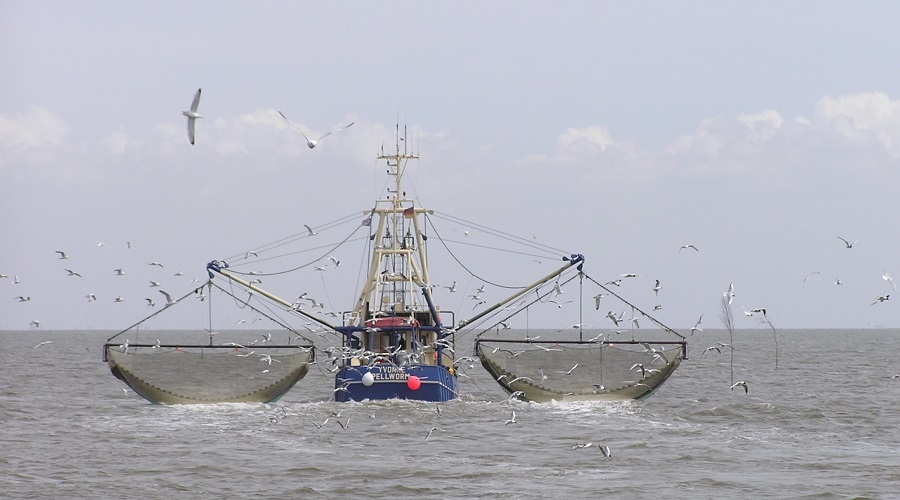
Crab boat working the North Sea. Reference image by Krabbenkutter Ivonne/Pellworm bei Südfall, Wikimedia Commons.
Two hundred and ninety scientists from 46 countries are asking members of the World Trade Organization (WTO) to take a bold step and pass a motion to ban harmful fisheries subsidies at their 12th Ministerial Conference that will take place from November 30 to December 3, 2021, in Geneva.
In an open letter published in Science and spearheaded by Dr. Rashid Sumaila, Canada Research Chair in Interdisciplinary Ocean and Fisheries Economics at the Institute for the Oceans and Fisheries and the School of Public Policy and Global Affairs, University of British Columbia, the researchers say that the WTO has a unique opportunity to pass an effective agreement that eliminates subsidies for fuel, distant-water and destructive fishing fleets, and illegal and unregulated vessels.
Citing a comprehensive body of research, the signatories explain that government payments that lower the cost of fuel and vessel construction; provide price support to keep market prices artificially high, and back fleets that plunder the high seas, only incentivize overcapacity and lead to overfishing. Thus, they contravene the aims of the United Nations’ Sustainable Development Goal 14.6.
In their view, the 164 states represented at the WTO can use the upcoming meeting to sign an agreement that forbids such harmful practices, while allowing special and differential treatments for small-scale, sustainably managed wild fisheries that support food and nutritional security, livelihoods, and cultures, particularly in low-income countries.
Underpinned by transparent data documentation and enforcement measures, the researchers say the deal should also foster accountability by supporting low-income countries’ efforts to meet their commitments and transition to sustainable management.
In addition to Sumaila, some of the high-profile signatories to the letter include the Sea Around Us principal investigator, Daniel Pauly (UBC Institute for the Oceans and Fisheries), the Sea Around Us – Indian Ocean director, Dirk Zeller (University of Western Australia), Werner Antweiler (UBC Sauder School of Business), Philippe Cury (Institut de Recherche pour le Développement), Paul Ehrlich (Center for Conservation Biology, Stanford University), Michelle Tigchelaar (Stanford Center for Ocean Solutions), Natalie Ban (University of Victoria), Lisa Levin (Scripps Institution of Oceanography, University of California), Simon Levin (Princeton University), Elena Bennett (McGill University), Enric Sala (National Geographic, Pristine Seas), Karen C. Seto (Yale University), Paul Onyango (University of Dar es Salaam), Fiorenza Micheli (Hopkins Marine Station, Stanford University), Kristina Gjerde (IUCN Global Marine and Polar Programme), Christina Hicks (Lancaster University), Masahide Kaeriyama (Hokkaido University), Ibukun J. Adewumi (African Marine Environment Sustainability Initiative), and others.
Reference: Sumaila, UR et al. 2021. “WTO must ban harmful fisheries subsidies.” Science 374(6567): 544.

